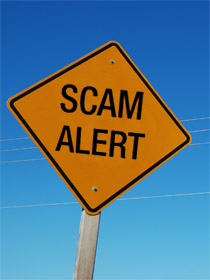One of the biggest scams that has been occurring in Costa Rica and overseas for many years is the infamous sweepstakes scam claiming that you have won substantial prizes in a lottery or other type of drawing. These unethical lowlifes pray mostly on senior citizens that make the unfortunate mistake of answering their phone when one of these soulless people happen upon their number from a list of people that play these types of drawings.
 Lottery scams will often use the names of legitimate overseas lotteries (often Spanish lotteries), so that even if you do some superficial research, the scam will seem real. Some examples of the real Spanish lotteries that the scammers falsely use are Loteria Primitiva and El Gordo. It is impossible for you to win these lotteries if you have not bought a ticket from an authorised distributor in Spain.
Lottery scams will often use the names of legitimate overseas lotteries (often Spanish lotteries), so that even if you do some superficial research, the scam will seem real. Some examples of the real Spanish lotteries that the scammers falsely use are Loteria Primitiva and El Gordo. It is impossible for you to win these lotteries if you have not bought a ticket from an authorised distributor in Spain.
Some other names that scammers will often use are the International Lotto Commission and the Princess Diana Lottery, among others.
You could also be urged to keep your winnings private or confidential, to ‘maintain security’ or stop other people from getting your ‘prize’ by mistake. Scammers do this to prevent you from seeking further information or advice from independent sources.
You will usually be asked to pay some fees to release your winnings. Scammers will often say these fees are for insurance costs, government taxes, bank fees or courier charges. The scammers make money by continually collecting these ‘fees’ from you and stalling the payment of your ‘winnings’. You will lose all the money you pay to the scammers.
You may also be asked to provide personal details to ‘prove’ that you are the correct winner and to give your bank account details so the prize can be sent to you. The scammer will use these details to try to misuse your identity and steal any money you have in your bank account.
Warning Signs
- You are asked to send a fee or bank account details to collect your prize. Legitimate lotteries do not require you to
 pay a fee to collect winnings. This usually consists of sending a Western Union to someone in San Jose, Costa Rica or another Central American country
pay a fee to collect winnings. This usually consists of sending a Western Union to someone in San Jose, Costa Rica or another Central American country - A full street address is not given. Instead, a post office (PO) box number, email address or mobile phone number is provided as a contact point.
- The sender claims that they have identified you as a winner by randomly choosing your email address. Official lottery offices do not select prize winners this way nor do they use email to advise players that a prize has been won. Sweepstake scammers email as many people as they can.
- The sender claims the offer is legal.
- The sender claims the offer has government approval.
- Never send money to anyone you are not totally sure about.
- Do not send any money or pay any fee to claim a prize or lottery winnings.
- Money laundering is a criminal offence: do not agree to transfer money for someone else.
- Make sure that cheques have been cleared by your bank before transferring or wiring any refunds or overpayments back to the sender.
- Do not pass on chain letters or take part in pyramid schemes: you will lose your money and could lose your friends.

